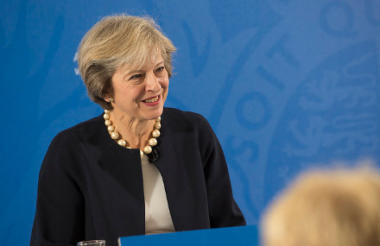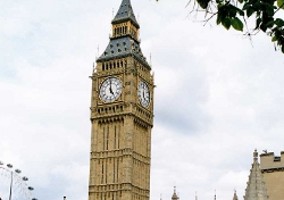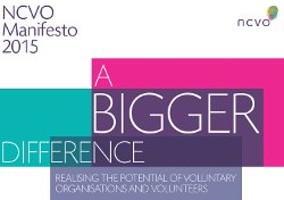Representatives from the sector’s main umbrella bodies have said that charities have a vital opportunity to make their voices heard, after Prime Minister Theresa May's decision to announce a snap general election this morning.
But they also warned that tighter campaigning rules will come into place as a result of the Lobbying Act.
Parliament is expected to be dissolved in early May, with an election on 8 June, as long as two-thirds of MPs back a vote to dissolve Parliament tomorrow.
This morning NCVO, Acevo, the Charity Finance Group, Navca and Charities Aid Foundation have all said this morning that charities have a role to play over the coming weeks.
NCVO: ‘We must remind politicians of the role of volunteers’
Sir Stuart Etherington, chief executive of NCVO, said: “We will be using the coming weeks to remind politicians of all parties of the crucial role of charities and volunteering in our national life. We know that, with the right conditions, charities can make an even bigger difference.
“Brexit is going to be a very big part of the election debate. Charities have many interests in Brexit negotiations, for example on freedom of movement and staffing. Now is the time to make the case for policies and positions that would be best for them and the people they work for."
NCVO also urged charities to familiarise themselves with Charity Commission guidance on campaigning. A spokesman said: "It’s crucial that charities take what opportunities they can during what will be quite a short election period to get their issues on the agenda, but that they are also extra vigilant about party political neutrality."
CFG: ‘Opportunity to make our voices heard’
Caron Bradshaw, chief executive of the Charity Finance Group said: “This snap election is a critical opportunity for charities to make their voices heard and help politicians to understand the role of charities in addressing some of the biggest challenges facing Britain.
“Charities must make bold proposals to all political parties, and all sides need to recognise to get the most out of the sector and strengthen our communities, then they absolutely have to help charities. They can do this by removing the barriers that hamper them from doing their work as effectively as possible.
“Charity Finance Group will work with partners across the sector to communicate the importance of the sector to all parties and clearly set out how the next government can practically help charities to do their work.”
Acevo: ‘Three-tier test of committement to the sector’
Vicky Browning, chief executive of Acevo, said: “Acevo will be writing to all major parties to outline a three-tier test of any parties’ commitment to the sector."
She said the tests were:
- The next government must commit to meaningful engagement with charities throughout the process of exiting the European Union.
- There must be significant reform of part two of the Lobbying Act as recommended by Lord Hodgson.
- The government must ensure that public service contracts deliver social value as well as economic value, including a greater commitment to prevention programmes.
“At this critical moment in the national debate now is not the time for charities to be silent," she said. "Charity leaders need to take courage from their convictions and speak out on behalf of their beneficiaries.
“A general election underlines the critical role of the independent political perspectives that charities bring to bear. A timid sector does not serve its beneficiaries or causes – that alone should give leaders the confidence to speak frankly.”
CAF: ‘Real danger the Lobbying Act may deter charities’
John Low, chief executive of the Charities Aid Foundation, said: “Since last year’s EU referendum, people across the country are becoming increasingly active in political and social issues. There is a growing appetite to make a difference and many see charities as a way to achieve that
“As we head into a general election, there is a real danger that the Lobbying Act may deter charities from fulfilling this fundamental role which is central to our democracy.
“While not engaging with party politics, it is both legitimate and vital for charities to influence government and opposition policies on behalf of their beneficiaries. We should support and protect their proud and historic role in our national debate.
“We urge the government to make it crystal clear that charities can contribute their insight and expertise, which is so important at this crucial time in our country’s history.”
Navca: 'politicians need concrete policies about charities'
Barney Mynott, head of public affairs at Navca said: “There is a threat that important issues affecting people and communities are ignored and this election becomes a re-run of the EU Referendum.”
“Now is the time for political parties to reverse the recent lack of concrete policies to support social action, volunteering and the voluntary sector. We want all main parties to publish meaningful manifesto pledges that support our sector. If they are struggling to think of suitable policies then a great starting point is the recent Lords Select Committee report.”
From Charity Finance magazine
Campaigning rules and guidance
The period between the end of the last Parliamentary term and the formation of a new government is known as purdah and means that civil servants and public bodies, including the Charity Commission, have to be careful about publishing anything that could be considered politically sensitive.
Under the Lobbying Act charities which are registered with the Electoral Commission will have to start reporting their activity.
The Charity Commission has produced specific guidance for charities campaigning during the run-up to the election. Additionally the principles outlined in CC9 Speaking out: Guidance on campaigning and political activities by charities still apply during the period.
Charities, elections and referendums advises every charity to “steer clear of explicitly comparing its views (favourably or otherwise) with those of political parties or candidates”.
Related articles












